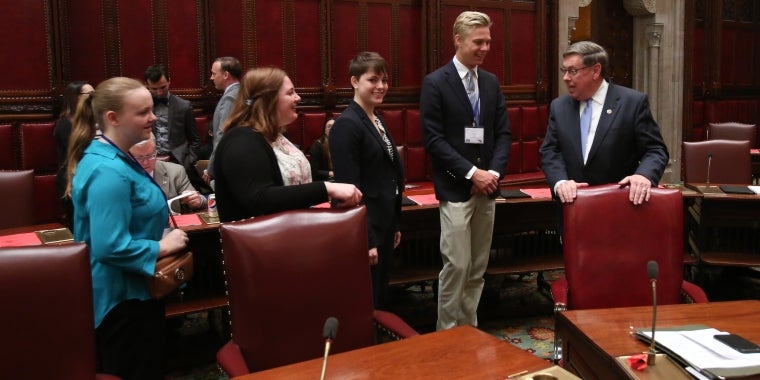
Seward Makes Grade With Business Leaders
James L. Seward
September 16, 2010
Unemployment in New York State is hovering at just over 8 percent according to recently released figures from the State Labor Department. While we are doing somewhat better than the nation as a whole (9.6 percent unemployment rate for the month of August) it is not nearly good enough.
I have been fighting hard for necessary job creation tools that will help jumpstart our upstate economy and put New Yorkers back to work. Recently, the Business Council of New York State recognized me for my record of standing up for measures that will help create jobs while consistently voting against higher taxes and out of control state spending.
The Business Council’s Voters' Guide is based on sponsorship and floor votes on various economic bills, including:
• Four budget-related bills, including the revenue bills from both the 2009-2010 and 2010-2011 state budgets;
• Five bills addressing labor or health benefit issues, including new insurance coverage mandates, price regulation of health insurance and bills that imposed significant new costs on private sector construction projects;
• Three “regulatory” bills, that would have imposed economy-wide greenhouse gas limits, severely limited telecommunications mergers and created new “citizen suit” enforcement authority;
• Two distinctly different approaches to creating a new, statewide economic development power program to support energy-intensive businesses and jobs;
• A cap on real property tax increases at the lesser of 4 percent or 120 percent of the Consumer Price Index.
Based on my voting record, I received the second highest score in the senate. While I am pleased with the recognition, I am disappointed because many of the bills, opposed by the Business Council, received approval thanks to short-sighted lawmakers who don’t seem to mind mortgaging our state’s future.
Many of these measures, particularly the budget bills, imposed new taxes and fees on our small businesses, while at the same time, deferred tax credits and other job creation tools. Like the Business Council, I opposed these measures. I also voted against the budget because it simply spends too much.
Take a look inside the numbers. The state comptroller says the 2010-11 state budget spends $136 billion and was balanced using $16.7 billion in one-shot revenues that will soon disappear. According to the comptroller’s analysis, the new state budget increased spending by more than seven percent, which is almost six times the current rate of inflation.
The comptroller’s report also calls the budget structurally unsound, saying the spending plan has placed New York “on the edge of a very steep financial cliff” because is relies on “risky resources” that could result in a projected budget deficit of $15.6 billion by 2013-14.
In order to turn the situation around, New York needs to shut down runaway spending, cut taxes and provide real tools that will help our business community grow. Along with saying no to the faulty budgets of the past two years, I have worked with others to offer sound plans that will help right the ship.
Among those proposals, the 2010 Job Creation and Retention Plan is an initiative that can still be utilized. It includes tax credits tied directly to new private sector job creation to reward businesses that stay and grow in New York. It would also eliminate certain taxes for small businesses and manufacturers, create a special commission to eliminate burdensome government red tape and place a moratorium on new taxes, fees and regulations that stifle business growth.
The plan provides real incentives that will improve our economic climate and get people working. I also proposed cutting state spending – including reducing expenditures on Medicaid and making state government smaller by consolidating state government agencies.
The blueprint to move our state forward is available. The business leaders have embraced the plan, and it is time Albany leaders do the same before it is too late.
#####
Share this Article or Press Release
Newsroom
Go to NewsroomFamilies Have Suffered Enough
May 24, 2017



